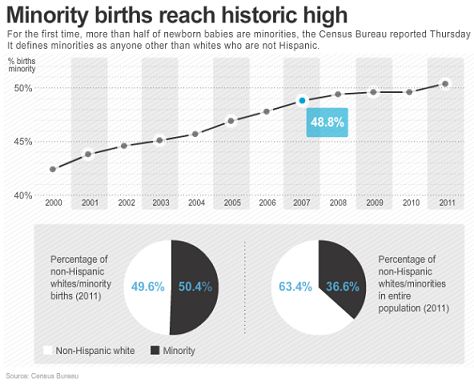US: Election 2012: Why Ethnicity is Destiny for the GOP – by Bruce Barlett
 Last week, the Census Bureau made
nationwide headlines when it announced that for the first time since
Native Americans were the dominant race, minorities make up more than 50
percent of births in the U.S. It defines a minority as anyone who is
not single-race white and is not Hispanic.
Last week, the Census Bureau made
nationwide headlines when it announced that for the first time since
Native Americans were the dominant race, minorities make up more than 50
percent of births in the U.S. It defines a minority as anyone who is
not single-race white and is not Hispanic.The change results from the continuing sharp growth of the Hispanic population, which is now the largest minority group in the U.S. African Americans, which were long the dominant minority group, have slid into second place. There are now 52 million Americans of Hispanic heritage versus 44 million blacks.
The Census Bureau also makes projections of the future population based on fertility rates, family size, immigration and other factors. Its latest estimate projects that the white population will fall from 64 percent of the population in 2010 to 56 percent by 2030. The black and Asian populations will be about unchanged in percentage terms. But the Hispanic population will rise sharply from 16 percent to 22 percent.
A new report from Lincoln Park Strategies shows that growth of the Hispanic population has important electoral implications. The reasons are twofold. First, Hispanics are heavily concentrated in a few states. Second, they tend to vote Democratic.
According to a new NBC News/Wall Street Journal poll, which oversampled Hispanic voters to get more accurate data, three-fifths of Hispanics are Democrats versus only one-fifth that are Republicans. They support Barack Obama over Mitt Romney by about the same margin.
In addition, a recent Pew survey says Hispanics tend to be much more liberal than the general population; 30 percent favor that label compared with just 21 percent of the general population. On the question of whether they favor bigger government or smaller government, Hispanics favor big government by a 75 percent to 19 percent margin. By contrast, the general population favors smaller government by a 48 percent to 41 percent margin. Moreover, first and second generation Hispanics tend to be more liberal than those third generation or higher. These facts suggest that Hispanics are likely to remain overwhelmingly Democratic for the foreseeable future.
Putting the political leanings of Hispanics together with population growth estimates, the Lincoln Park Strategies report estimates that the number of electoral votes that are safely Democratic will rise from 165 in 2012 to 180 in 2024 and 202 in 2032. By contrast, the base electoral vote for Republicans will fall from 143 in 2012 to 133 in 2032. To win the White House, a candidate needs 270 electoral votes.
Consequently, Republican strategists have long urged their party to reach out to the Hispanic community. This is why George W. Bush made immigration reform a key issue in 2006. However, his party killed immigration reform the following year. In the Senate, only 12 Republicans supported Bush on this issue, with 37 opposed.
Immigration reform remains very unpopular among the Republican rank-and-file, which is why Romney has tended to take a hard line on the issue. While pleasing to grassroots Republicans, however, it complicates his chances of taking the White House.
Political observers had speculated that Romney would try to soften his party’s and his own hard line on immigration once he won the Republican nomination. However, in a speech to the Latino Coalition’s Annual Economic Summit on Wednesday, he never mentioned the issue a single time.
To be sure, Hispanics are not single-issue voters; they care about issues other than immigration policy. But it is clearly their dominant issue and it sends a message to all Hispanics that they are not especially welcome in this country when they hear politicians make strident comments about the evils of illegal immigration and talk favorably about deporting all those in this country illegally.
It’s worth noting as well that by many measures, the Spanish-language Univision Network is the most widely watched television network in the U.S. My bilingual friends report that Univision carries very extensive reporting on the U.S. presidential race with special emphasis on the candidates’ views on immigration policy.
Many Republicans appear to think that simply putting a Hispanic like Sen. Marco Rubio of Florida on the ticket will be sufficient to help Romney neutralize Obama’s Hispanic advantage. However, polls show Romney already ahead in Florida and having Rubio on the ticket has almost no impact.
More importantly, Hispanics in Florida are largely of Cuban descent and have long tended to be more conservative, politically, than those from Mexico, Puerto Rico and other Latin American countries. It is highly doubtful that someone of Mexican descent living in California is going to be particularly impressed by having a Cuban from Florida on the Republican ticket. In short, it doesn’t change the political dynamics and probably won’t happen.
I don’t foresee Romney doing much to reach out to Hispanic voters this year. He is too mistrusted by the GOP’s dominant right wing to have much wiggle room on immigration, an issue most of them feel passionately about. His hope for victory depends on getting as much turnout from the Republican base as possible, not reaching out to voters that generally vote Democratic.
However, should Romney win, he will have no choice but to confront his own party on immigration and try to neutralize the Democrats’ advantage with Hispanics, just as Bush did. Unless Republicans find a way of appealing to Hispanics, their long-term future is dim regardless of what happens in November.
No comments:
Post a Comment